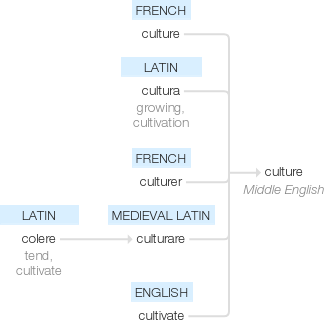Culture
Middle English (denoting a cultivated piece of land): the noun from French culture or directly from Latin cultura ‘growing, cultivation’; the verb from obsolete French culturer or medieval Latin culturare, both based on Latin colere ‘tend, cultivate’ (see cultivate). In late Middle English the sense was ‘cultivation of the soil’ and from this (early 16th century), arose ‘cultivation (of the mind, faculties, or manners’); culture (sense 1 of the noun) dates from the early 19th century.
wiktionary
From Middle French culture(“cultivation; culture”), from Latin cultūra(“cultivation; culture”), from cultus, perfect passive participle of colō(“till, cultivate, worship”) (related to colōnus and colōnia), from Proto-Indo-European *kʷel-(“to move; to turn (around)”).
etymonline
culture (n.)
mid-15c., "the tilling of land, act of preparing the earth for crops," from Latin cultura "a cultivating, agriculture," figuratively "care, culture, an honoring," from past participle stem of colere "to tend, guard; to till, cultivate" (see colony). Meaning "the cultivation or rearing of a crop, act of promoting growth in plants" (1620s) was transferred to fish, oysters, etc., by 1796, then to "production of bacteria or other microorganisms in a suitable environment" (1880), then "product of such a culture" (1884).
The figurative sense of "cultivation through education, systematic improvement and refinement of the mind" is attested by c. 1500; Century Dictionary writes that it was, "Not common before the nineteenth century, except with strong consciousness of the metaphor involved, though used in Latin by Cicero." Meaning "learning and taste, the intellectual side of civilization" is by 1805; the closely related sense of "collective customs and achievements of a people, a particular form of collective intellectual development" is by 1867.
For without culture or holiness, which are always the gift of a very few, a man may renounce wealth or any other external thing, but he cannot renounce hatred, envy, jealousy, revenge. Culture is the sanctity of the intellect. [William Butler Yeats, journal, 7 March, 1909]
Slang culture vulture "one voracious for culture" is from 1947. Culture shock "disorientation experienced when a person moves to a different cultural environment or an unfamiliar way of life" is attested by 1940. Ironic or contemptuous spelling kulchur is attested from 1940 (Pound), and compare kultur.
